This story was produced in partnership withReporting Democracy, a cross-border journalism platform run by the Balkan Investigative Reporting Network.
It took three days and “advice from his security services” for Slovak Prime Minister Eduard Heger to consider and eventually decline a mid-March invitation from his Polish counterpart Mateusz Morawiecki to meet with President Volodymyr Zelensky in Kyiv, which at the time was being besieged and battered by Russia’s armed forces.
With his peers from Czechia, Poland and Slovenia choosing to show their solidarity with the Ukrainian people, it was a serious miscalculation by Heger less than a year into his premiership.
“I’m sorry if I disappointed people,” he later said, stressing that he was not faint-hearted.
Since then, he has strived to make amends. In early April, he joined the president of the European Commission, Ursula von der Leyen, on her trip to Ukraine’s capital and announced that Slovakia would hand over its Soviet-era air defence system to the country.
Heger, who described Russian President Vladimir Putin’s invasion against Ukraine as “a barbaric act” soon after it began, also pledged that his government would, in cooperation with the EU and NATO, throw its full support behind Ukraine. Slovakia, which has become temporary home to more than 77,000 refugees, has since provided Ukraine with military and humanitarian aid worth €130 million, agreed to NATO’s forward presence on its territory, and ordered its state firm Konštrukta-Defence to repair Ukrainian military vehicles.
“Heger has proven to be a reliable ally,” says Matej Navrátil, a foreign and security policy expert at the Slovak Academy of Sciences.
In addition to his clear foreign policy stance, observers have praised him for his willingness to step into the international arena, with his fluent English earning him high-profile invitations to appear on CNN and the BBC, during which he was grilled about Slovakia’s decades-long high dependence on Russian energy, as well as his attempts to restore trust in the prime minister’s office after years of misrule and scandal.
Yet his hold on the prime minister’s chair has never been weaker since he took office in April 2021.
Backseat driver
This calm and experienced former company executive and MP replaced Igor Matovič, the conflict-seeking and outspoken leader of the conservative Ordinary People and Independent Personalities (OĽaNO) political movement, the strongest of four parties in the coalition government, last year following a coalition crisis ignited by Matovič’s decision to buy a consignment of Russia’s Sputnik V COVID-19 vaccine without discussing it with his coalition partners.
“We will continue to pull together for Slovakia as we have so far,” Heger, the then-outgoing finance minister for OĽaNO, told Matovič at a press conference. Heger went on to compliment Matovič on his decade-long fight to hold the former prime minister Robert Fico of the Smer party to account for his 12 years of misrule. Fico has since been charged with the crime of establishing and supporting an organised crime group, the offence of abuse of power by a public official, and the repeated crime of endangering trade, banking, postal, telecommunications and tax secrecy.
However, Heger appointed Matovič finance minister, even though observers were predicting that the former prime minister would not allow Heger to step out of his shadow if he remained in government.
Indeed, in reaction to Heger’s initial refusal to travel to Kyiv, the former prime minister said he would go in his stead. A few months earlier, Matovič did not inform Heger in advance about his proposal to give pensioners €100 to help them out cope with surging energy bills.
Worse, for some observers, is that Heger has not tried to get the upper hand over or even criticise Matovič after a year at the helm of the government. “There is no prime minister these days,” political analyst Jozef Lenč of Ss. Cyril and Methodius University in Trnava maintains.
In fact, it is not clear to Lenč what Heger wants to achieve in domestic politics. “He does no politics – he just reacts to it,” the analyst says, pointing out a striking difference in his presentation in the foreign and domestic political arenas.
Coalition crisis brewing
Upon taking office, Heger expressed his belief that the government would be stable, that the four coalition parties would show unity, and that the government would succeed in reforming Slovakia with the help of a post-coronavirus recovery plan funded by €6.3 billion in grants from the EU’s €724-billion NextGenerationEU fund.
“People want to see the results of our work,” the prime minister has maintained. However, it has been an uphill battle for his government to agree on reforms and get them through parliament.
The coalition managed to pass major reforms to the health system and national parks last December. Yet Sme Rodina, one of the coalition parties, refused to vote for them.
To receive the first payment from the NextGenerationEU fund, Slovakia had to approve higher education and judicial reforms by the end of April. Yet after a year of debate, MPs only passed significantly rewritten, watered-down reforms at the last minute on March 23 (higher education) and April 27 (judiciary).
The prime minister has publicly said several times it is hard to find compromise within the coalition, and that no ideal solution can ever be reached. For this lack of courage and firmness in pressing for the reforms, he has been given different labels by both observers and the opposition, ranging from “a mediator” and “the government’s spokesperson” to “Matovič’s puppet”.
“He does nothing to act like a prime minister,” Lenč bemoans. “Either he doesn’t know how to be prime minister, doesn’t want to be one, or he is advised to act the way he has.”
And now Heger is dealing with a major coalition crisis.
When parliament failed to approve the arrest of former prime minister Fico on May 4, due to opposition from a coalition of MPs from Sme Rodina and OĽaNO – and thus prevented the courts from deciding on police custody for the MP – the coalition entered stormy waters.
Economy Minister Richard Sulík, who chairs the liberal coalition party Freedom and Solidarity (SaS), has claimed that OĽaNO can now no longer call itself an anti-corruption movement. Heger summed up the vote on Fico as “disappointing”, and his party sacked two MPs who did not vote for the former prime minister’s arrest.
Meanwhile, his finance minister continues to rock the boat. Matovič’s ministry came up with a package of social reforms intended to help Slovaks struggling with the cost of living rises. With Economy Minister Sulík’s SaS party withholding its support, Matovič held talks with the deputy chair of the far-right party People’s Party Our Slovakia (ĽSNS), Martin Beluský, in the hope of gaining its support for the package in parliament.
Heger, who as an OĽaNO MP voted for an abortion bill submitted by the ĽSNS in 2019, has said the discussions did “not bother me at all”. A trade-off would have been a problem to him, though. Instead, he was more critical of SaS, accusing the party of criticising the package for three months but coming up with no solutions – an accusation the party has refuted.
When asked about why it was taking so long to get financial help to needy people during an interview with Rádio Slovensko, a public radio station, on May 21, Heger said: “I’m head of the government. The prime minister is not a member of the Coalition Council, which is above me.” The council is made up of the four party leaders, which includes Matovič, not Heger.
The parliament approved Matovič’s package in a fast-track legislative procedure on May 24. Coalition parties, except for SaS, all voted for it and ĽSNS MPs also supported it. The package would have been passed even without the extremists, the post-voting calculation showed.
“We have a prime minister here, his name is Eduard Heger, and he must put his finance minister in his place,” Sulík told Rádio Expres on May 25.
Thus, the coalition crisis reflects to a large extent the longstanding fractious relationship between the coalition leaders Matovič and Sulík, which Heger appears to have little control over. “The government will hold together with or without Heger,” says Lenč. “Coalition parties have no other way to keep the government afloat.”
Lack of ambition
Observers point out that since April, at 33 percent according to a Focus poll, Heger is now actually the most trusted member of the current government for the first time. Conversely, Matovič is the least trusted politician in the government.
This opens up space for Heger to replace Matovič as party leader, but he has repeatedly said he is not interested in the post. Matovič even told the TASR newswire in early January that he could imagine replacing Heger.
Nor does Heger appear well suited to the presidency. In an April opinion piece for Postoj, a conservative daily, journalist Eva Čobejová wrote that Heger, “is not a strong statesman or a political thinker.” She added that the prime minister also lacks a political identity and higher ambitions.
Columnist Peter Schutz of the Sme daily wrote on May 19 that, “we can already imagine [Heger] as a statesman with a certain help of the imagination if only he didn’t compromise himself unnecessarily and deeply with his loyalty to OĽaNO’s leader.”
Heger has tolerated and defended Matovič up until now, despite his continuous verbal attacks on other ministers and President Zuzana Čaputová. Nor has he removed OĽaNO Interior Minister Roman Mikulec, who has faced several votes of no confidence, most recently for the failed management of the refugee crisis.
“If he made a decisive political move, such as the removal of an unpopular minister, it could help increase people’s trust in him,” argues Lenč.
By contrast, the former prime minister Peter Pellegrini managed to boost his popularity while in office until 2020. He then left Fico’s discredited Smer and established his own party, Hlas, which currently tops the opinion polls.
Since the war in Ukraine started, the prime minister has begun using more emotive and harsher rhetoric when addressing opposition leaders like Fico and Pellegrini, calling them “Russian agents” without providing any evidence, though both of them admittedly hold pro-Russian views.
“It seems to me like he is copying Matovič,” Lenč says.
Future Europe man
Even if foreign policy was not his field of expertise before he became prime minister, the war in Ukraine has given Heger greater visibility, which experts say he could use to his advantage if he is eyeing an EU post after the next election in 2024.
“He is consensual and oftentimes tries to seek a compromise, which is also characteristic of technocratic European politics,” says the Slovak Academy of Sciences’ Navrátil.
Nevertheless, Navrátil points out it is hard to pinpoint to what extent Heger’s ideas actually come from him and what role his advisors play in shaping his foreign policy views.
Senior analyst Łukasz Lewkowicz, of the Institute of Central Europe in Lublin, says in Poland Heger is often described as a conflict-avoiding technocrat, and his support for Ukraine and the signing of a defence cooperation agreement with the US are regarded positively by Poland.
“But when it comes to the Visegrad [Four] region, Poland has a closer relationship with Czech Prime Minister Petr Fiala,” he explains, adding that if Heger wanted to play a bigger role in the region, he would have to be more active in this area.
Analyst Lubomír Kopeček of Masaryk University in Brno asserts that Heger is little known to the Czech public, which is much better informed about the long-standing conflicts within his government. “I do not think that any Czech government politicians, knowing how uncertain and unstable the existence of the current Slovak government coalition is, would invest in a longer-term project that would depend on the current Heger government,” he says.
As for a possible career in EU structures, the Polish expert Lewkowicz says Herger’s experience as a corporate executive and finance minister would undoubtedly make working in international financial institutions a possibility.
Lenč, however, points out that OĽaNO would have to fare much better in the next election than today’s polls show and Heger must also work harder on his himself. “If he does not get better on the domestic political scene, the chances that he would go on to become a European politician are small,” he says.


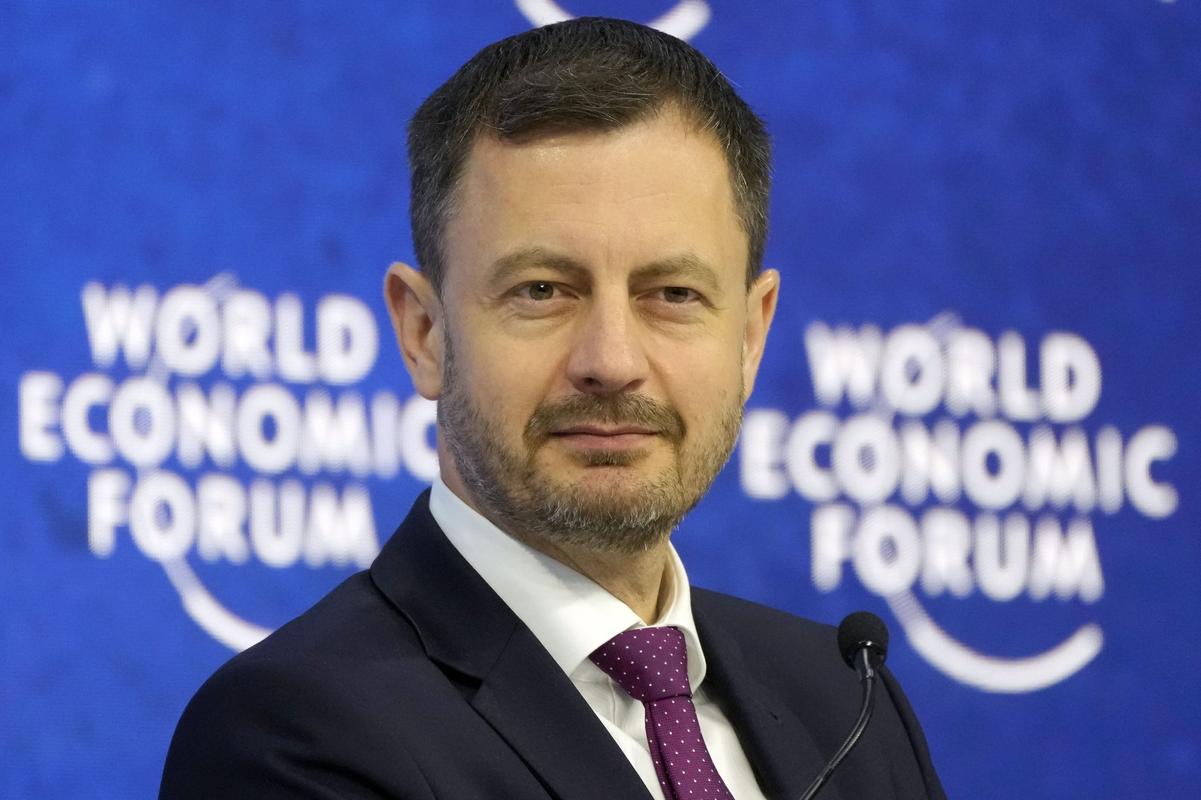 Eduard Heger, Prime Minister of the Slovak Republic, attends a panel session at the World Economic Forum in Davos, Switzerland, on May 25, 2022. (source: AP - Markus Schreiber)
Eduard Heger, Prime Minister of the Slovak Republic, attends a panel session at the World Economic Forum in Davos, Switzerland, on May 25, 2022. (source: AP - Markus Schreiber)
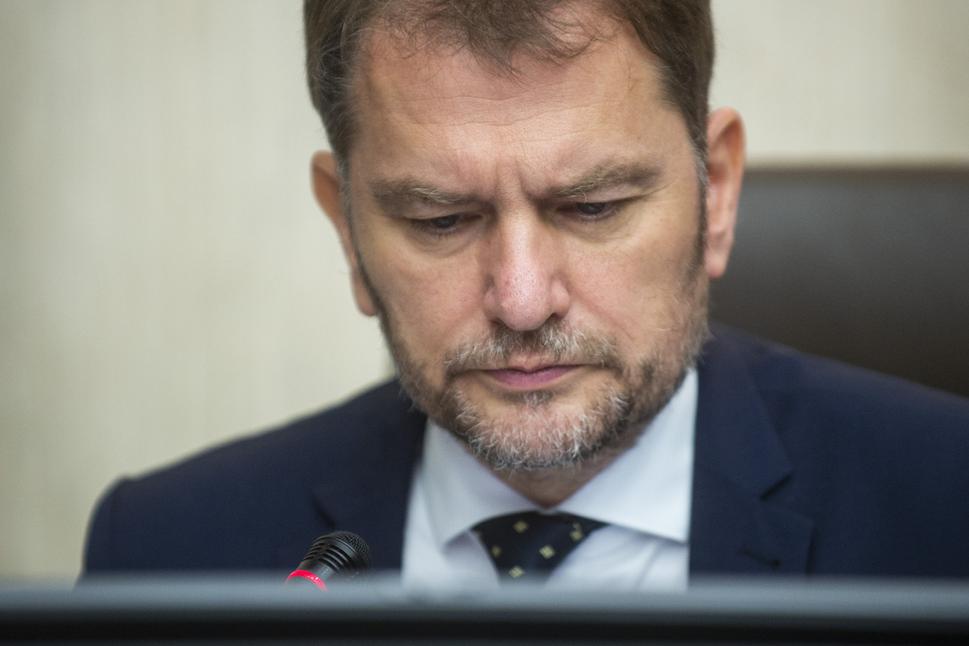 Deputy PM and Finance Minister Igor Matovič (OĽaNO) before the 81st meeting of the Government of the Slovak Republic on May 26, 2022 in Bratislava. (source: TASR - Jakub Kotian)
Deputy PM and Finance Minister Igor Matovič (OĽaNO) before the 81st meeting of the Government of the Slovak Republic on May 26, 2022 in Bratislava. (source: TASR - Jakub Kotian)

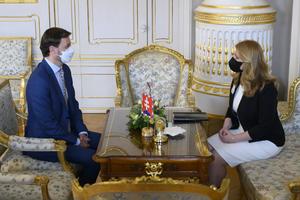
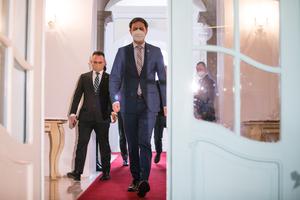
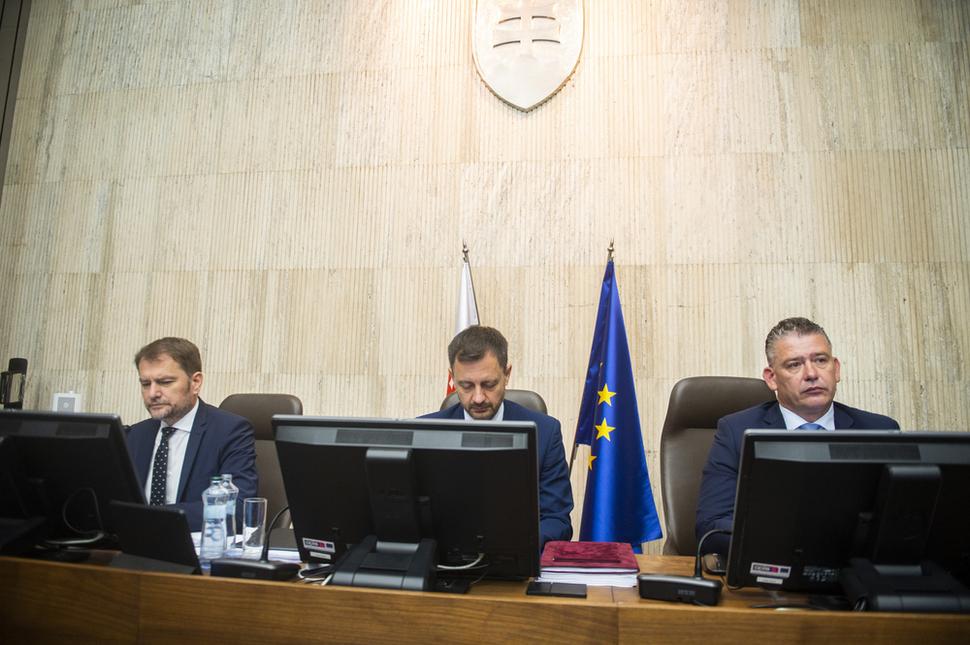 (R – L) Interior Minister Roman Mikulec, PM Eduard Heger (both OĽaNO), and Finance Minister Igor Matovič (OĽaNO) during the 81st meeting of the Government on May 26, 2022 in Bratislava. (source: TASR - Jakub Kotian)
(R – L) Interior Minister Roman Mikulec, PM Eduard Heger (both OĽaNO), and Finance Minister Igor Matovič (OĽaNO) during the 81st meeting of the Government on May 26, 2022 in Bratislava. (source: TASR - Jakub Kotian)
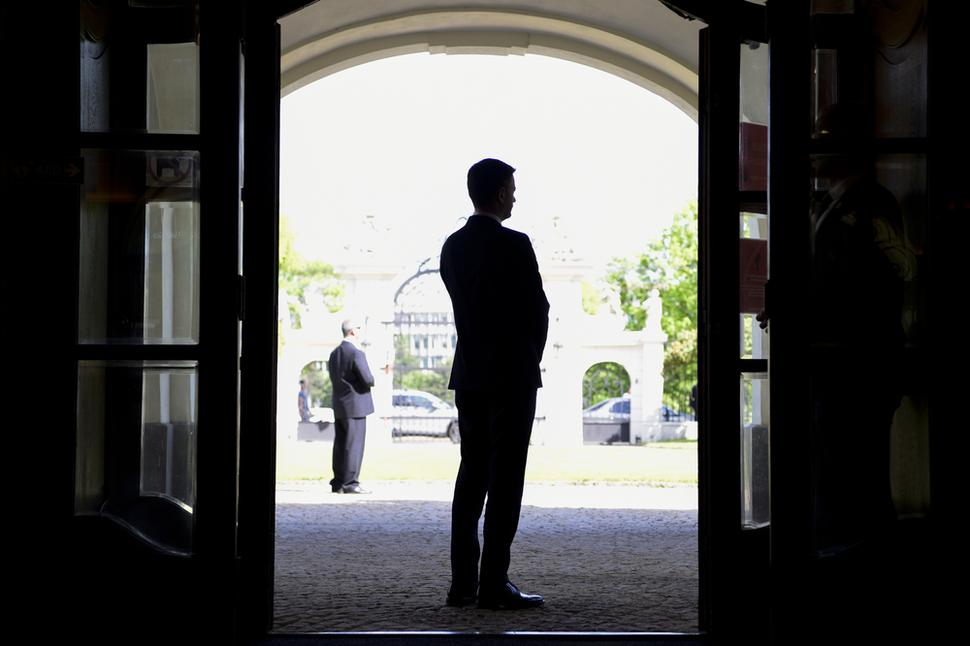 Prime Minister of the Slovak Republic Eduard Heger waits for the arrival of the President of the Republic of Poland Andrzej Duda in the historic building of the Office of the Government of the SR on May 11, 2022 in Bratislava. (source: TASR - Pavol Zachar)
Prime Minister of the Slovak Republic Eduard Heger waits for the arrival of the President of the Republic of Poland Andrzej Duda in the historic building of the Office of the Government of the SR on May 11, 2022 in Bratislava. (source: TASR - Pavol Zachar)